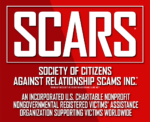SCARS™ Scam Basics: Stolen Photos
Fact Scammers Have Created More Than ONE BILLION Fake Identities With Most Of Them Using Stolen Photos
Photos Just Like These:
They use them to create falsified passports used in an actual internet romance scams, such as this one:

SCAMMER PROFILE: Jessica Edward – Nurse Stranded in Nigeria – jessicaedward14@yahoo.com – Fake Scammer Passport
The deception can be obvious to observers — for example, the photo on this passport does not comply with regulations for size or pose — but these signs are often ignored by victims.
Romance scammers create personal profiles using stolen photographs of attractive people for the purpose of asking others to contact them. This is often known as catfishing.
Communications are exchanged between the scammer and victim over a period of time until the scammer feels they have connected with the victim enough to ask for money. These requests may be for gas money, bus or airplane tickets to visit the victim, medical or education expenses. There is usually the promise the scammer will one day join the victim in the victim’s home. The scam usually ends when the victim realizes they are being scammed or stops sending money.
Stolen photos are one of the basic ingredients that scammers employ!
Impersonation Victims
Remember the person in the photo is NOT the scammer. The scammer is the one hiding behind the stolen photos!
Never blame the person in the photo and never try to contact them – they already know from the thousands of other victims that have contacted them over the years! Leave them in peace.

SCARS™ Team
A SCARS Division
Miami Florida U.S.A.
TAGS: Romance Scams, Scam Basics, Stolen Photos, Fake Identities, Impersonation,
END
– – –
Tell us about your experiences with Romance Scammers in our Scams Discussion Forum on Facebook »
– – –
FAQ: How Do You Properly Report Scammers?
It is essential that law enforcement knows about scams & scammers, even though there is nothing (in most cases) that they can do.
Always report scams involving money lost or where you received money to:
- Local Police – ask them to take an “informational” police report – say you need it for your insurance
- Your National Police or FBI (www.IC3.gov »)
- The SCARS|CDN™ Cybercriminal Data Network – Worldwide Reporting Network HERE » or on www.Anyscam.com »
This helps your government understand the problem, and allows law enforcement to add scammers on watch lists worldwide.
– – –
Visit our NEW Main SCARS Facebook page for much more information about scams and online crime: www.facebook.com/SCARS.News.And.Information »
To learn more about SCARS visit www.AgainstScams.org
Please be sure to report all scammers HERE » or on www.Anyscam.com »
All original content is Copyright © 1991 – 2020 SCARS All Rights Reserved Worldwide & Webwide – SCARS/Romance Scams Now & SCARS/Society of Citizens Against Relationship Scams are all trademarks of Society of Citizens Against Relationship Scams Incorporated (formerly the Society of Citizens Against Romance Scams)
Legal Notices:
All original content is Copyright © 1991 – 2020 SCARS All Rights Reserved Worldwide & Webwide. Third-party copyrights acknowledge.
SCARS, RSN, Romance Scams Now, SCARS|WORLDWIDE, SCARS|GLOBAL, SCARS, Society of Citizens Against Relationship Scams, Society of Citizens Against Romance Scams, SCARS|ANYSCAM, Project Anyscam, Anyscam, SCARS|GOFCH, GOFCH, SCARS|CHINA, SCARS|CDN, SCARS|UK, SCARS Cybercriminal Data Network, Cobalt Alert, Scam Victims Support Group, are all trademarks of Society of Citizens Against Relationship Scams Incorporated.
Contact the law firm for the Society of Citizens Against Relationship Scams Incorporated by email at legal@AgainstScams.org
















Please Leave A Comment - Tell Us What You Think About This!